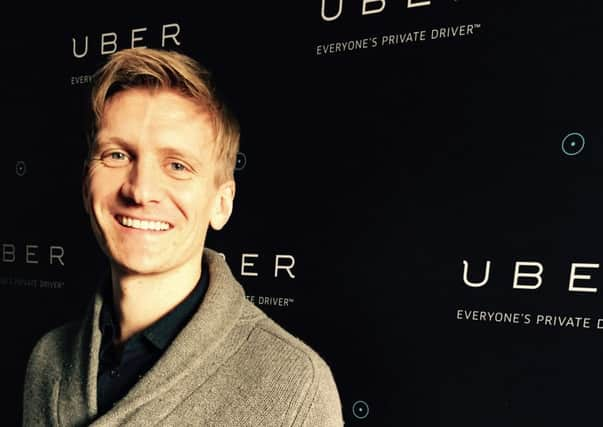Tech giant Uber chooses Wakefield for fifth British city


The Silicon Valley start-up chose the West Yorkshire city to continue its UK roll-out after launching in London and then Manchester, Leeds and Birmingham.
Barely five years old, Uber is the global market leader in on-demand transit services and has attracted a $40bn valuation.
Advertisement
Hide AdAdvertisement
Hide AdIt works by connecting licensed drivers with passengers at the touch of a button via a smartphone app, cutting out traditional private hire firms.
Tom Elvidge, general manager in Yorkshire, told The Yorkshire Post that 10,000 people in Wakefield had opened the Uber app since it launched in Leeds in November, which he described as “a phenomenal response”.
He added: “We have seen really strong take-up in the UK generally.
“London is a little different because it is a bit older (launching in 2012) and so much bigger but definitely the growth in Leeds, Manchester (May 2014) and Birmingham (February 2015) has been really healthy, even compared to other cities globally.”
Advertisement
Hide AdAdvertisement
Hide AdUber is now in 291 cities in 54 countries across the world. Mr Elvidge said the service works well where there is good existing transport infrastructure.
He added: “Wakefield is an area that is well served by transport already, it has the main line rail... and probably has a population that is particularly tech savvy.
“It has been through a lot of regeneration and there are a lot of new businesses in Wakefield and a lot of younger early adopters of tech so hopefully it is going to resonate really well.”
He said Uber is “first and foremost” focused on bringing a reliable car service to the region. The company could then consider launching other products, he added.
Advertisement
Hide AdAdvertisement
Hide Ad“It’s great that as a company we can use other cities to prove the model, refine it, getting it working really well and then roll it out elsewhere when it’s ready to go,” said Mr Elvidge, a Yorkshireman who is a former vice president of derivatives operations strategy at investment bank Goldman Sachs in New York.
“Our CEO (Travis Kalanick) talks about when you are in the business of delivering cars in less than five minutes, you can use that technology to apply to many other things.
“The food delivery service in Los Angeles has been going incredibly well. You can order your lunch through the Uber app, press a button and your lunch turns up in five minutes.”
Uber trialled the food service in LA and launched UberEats in Barcelona last month. It is currently fighting a ban in Spain, an example of the challenges the US company is facing through its disruptive model.
Advertisement
Hide AdAdvertisement
Hide AdUber has provoked protests from incumbent car hire firms throughout the world, most recently in Brussels last week when taxi drivers jammed the streets ahead of the company’s possible arrival.
Mr Elvidge said the Leeds private hire market is highly competitive.
“We have two stakeholder groups - drivers and passengers. Having competition is good for both of those. That’s the way we like it. Having a complimentary service is how we like to operate,” he added.
A spokesman for Uber said the company’s ambition is to be in every major UK city in due course, but will need a team on the ground in each location first.
Advertisement
Hide AdAdvertisement
Hide AdHe told The Yorkshire Post: “We do have licensing applications in with a number of cities.”
Potentially revolutionary effects
Uber’s car pool service, which is yet to reach UK shores, is simple in a product sense but has potentially revolutionary effects.
General manager Tom Elvidge said: “If you book an Uber and select the Pool option and somebody else is going in the same direction, if the deviation from your route is less than five minutes, then the driver will stop and pick up the second passenger an take them along the way as well. You get into this concept of the driver having a passenger in the back of their vehicle perpetually. It reduces costs to the passenger so it starts to challenge the cost of Uber versus car ownership.”
Hypothetically, this vision could applied to the major trunk roads in and out of Leeds, he added.